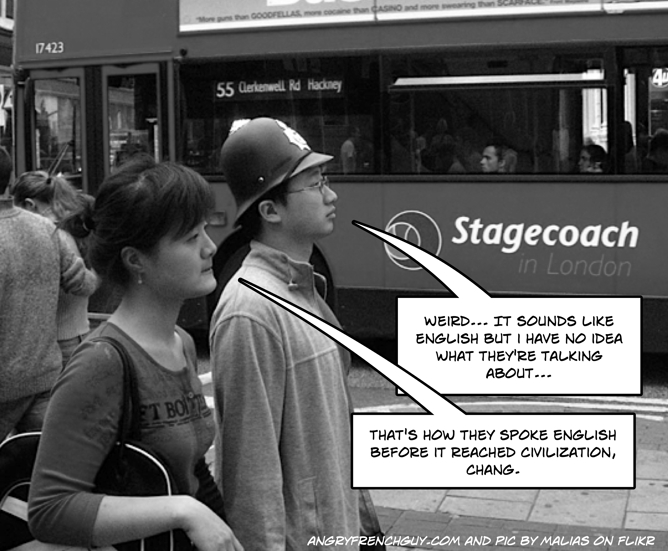I’m just a typical English-speaker

I’m an average English-speaker, typical of English-speakers worldwide.
I use English everyday. I use it for work, I use it for fun. I use it to look for stuff on the internet, to read books, to watch films and television. I use it to read my ipod’s instruction manual. I use it on the street with German tourists looking for « the underground city ».
I use English all the time, yet, English is not my language. I’ve never been to school in English. I never ever use it when I’m a consumer with money to spend in Montreal. I never use it to communicate with my government. My newspaper is not in English. The music I prefer is not in English. I’ve never used it with my father or my mother.
English-speaking is not what I am, it’s something I do. I’m more a speaker of English than an English-speaker. A user of English, really.
Today, we, the users of English, are much more numerous than native English-speakers. Estimates vary, but native English-speakers number between 329 million and 500 million. There are at least three times as many of us who use English as a second (or third, or fourth) language.
Native speakers haven’t realized this yet, but we are no longer speaking their English, they are speaking ours.
Awed by the fantastic success of English as the global Lingua Franca of business, diplomacy and scholarship, many did not notice that English was simultaneously losing ground in absolute numbers. While a generation ago English was the second most widely spoken first language after Chinese, it is now tied with Spanish and Hindi-Urdu. Arabic, the fastest growing language in the world today, is catching up fast.
This does not mean that English will eventually lose it’s Lingua Franca status. It means that it is us, the users of English, speakers of English AND other languages who will make that call.
Globalization is not colonization. It is no longer the benevolent British and Americans who are teaching us the white man’s language, but ourselves, teaching ourselves. China made English mandatory in primary schools in 2001. China produces 20 million English-speakers a year. That’s the equivalent of one Australia or one English-Canada every year!
China invested massively in English but it is not converting to English. Chinese schoolchildren are still learning Mandarin. Mandarin AND English. The Chinese government is also encouraging foreigners to learn Mandarin trough the Confucius Institutes, the Chinese version of the British Council or the Alliance Française.
Global English is bigger than any one country or organization, but if any political entity in the world can influence significantly the future of the language today it is not London, Washington or the UN. It is Beijing.
And the new Chinese users of English, like the rest of us, don’t have any strong emotional attachment to the language or the Anglo-Saxon culture.
It’s been a while since Rupert Murdoch was the only man able to uses his satellites to carpet bomb the planet with Baywatch reruns and Rambo movies. Today Al-Jazeera has a 24 hour English language news network broadcasting out of Qatar. So do China, Russia, Iran, France, Germany, Singapore and Egypt. Christ, even Kim-Jong Il has an English-language website. Now, with the exception of Singapore, there is no significant trend toward the adoption of English as a first language in any of these countries. English is just the language these countries use to speak to the rest of the world
We record pop albums in English, make action movies in English and video games in English. What we do in English is not an American product, though. Actually it’s not even for the Anglo market. Disney makes most of it’s profit outside the USA and so do we.
According to the World Tourism Organization three quarters of international travel is now between non-English-speaking countries. We users of English use the language to get on planes, find hotel rooms and negotiate cab fares, but also to learn about our hosts culture and to express our own. Cultures that are not American, British or Anglo-Saxon
Today the world speaks English. But it is not English-speaking. The vast majority of English-speakers speak more than one language. It’s just one part of our communication toolbox. We use English for instantaneous real-time communication with people around the world who’s language we don’t speak.
Some say it’s a whole new language. A lightweight high performance version of English stripped of its unnecessary cultural baggage. A grammatical frame on which engineers, financiers and bobble head collectors hang the vocabulary of their trade. Not a simplistic or partial English. Just the English we need. Some of us will use English all our lives and yet will never read Norman Mailer or get The Office. Less than perfect fluency is not a handicap.
In fact the truly disadvantaged in this new global code-switching world are those insular unilingual native English-speakers with their hard to understand olde Englishe of yore…